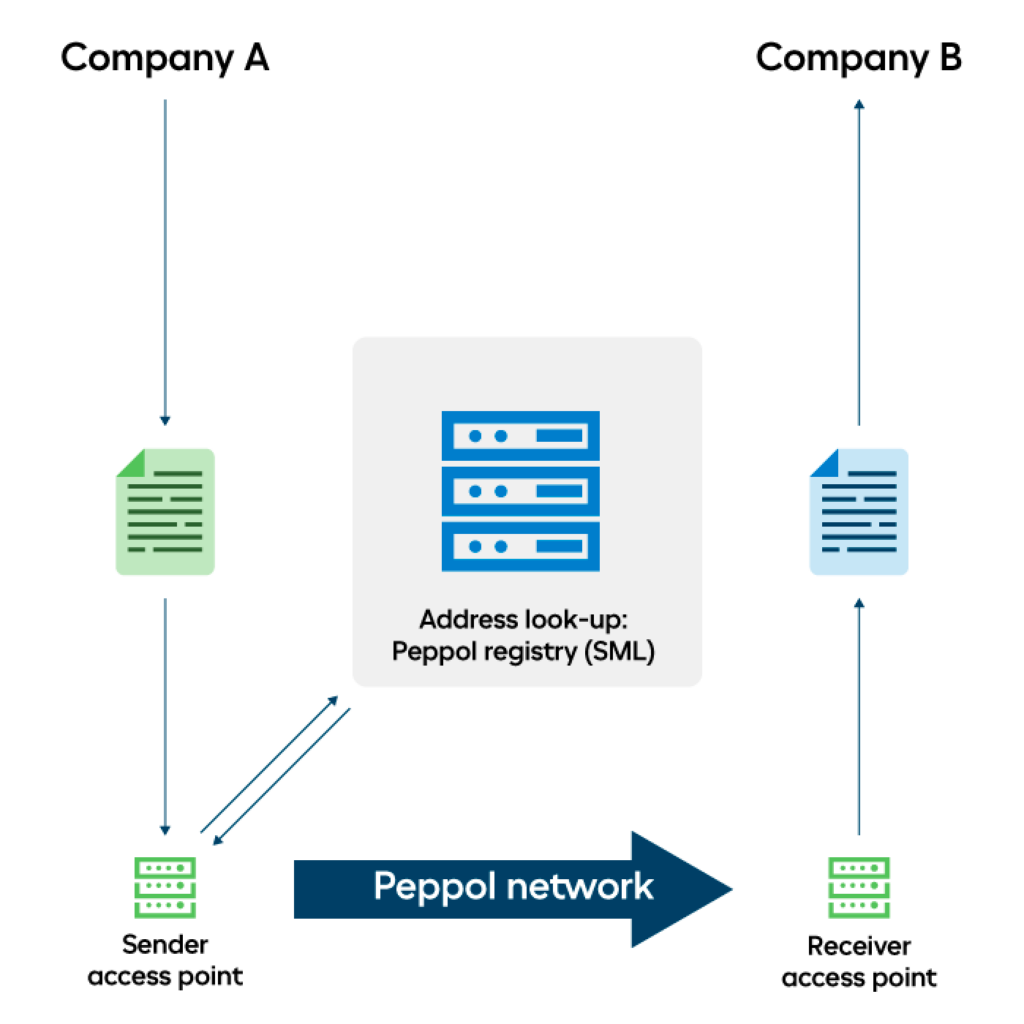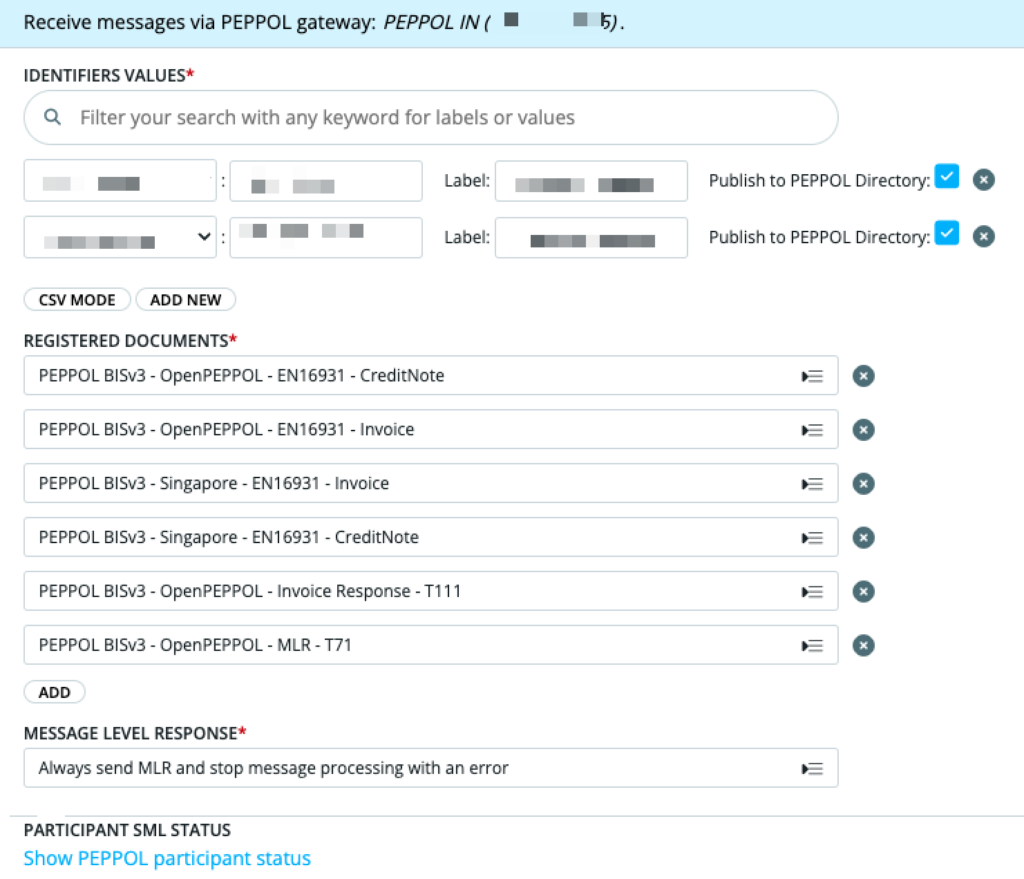EDI, B2B Integration, and Peppol: A Guide to Easy Document Exchange
What will you find out in the Peppol guide?
The digital age has transformed the way businesses exchange documents. Electronic Data Interchange (EDI) has emerged as a cornerstone for efficient and accurate data exchange, enabling the seamless transmission of various business documents, from despatch advice and order acknowledgements to purchase orders and electronic invoices.
B2B integration tools like Babelway, built on EDI standards, further streamline operations by automating document flows and reducing manual errors. The Peppol network leverages EDI standards to facilitate trade to enable secure, standardised, and interoperable electronic communication between businesses across Europe and beyond.
In this guide, we’ll focus on the use case of e-invoices, one of the many document types that B2B integration tools, EDI, and Peppol support to offer an easy solution for business-to-business document exchange.
By Ioana Ploesteanu, Product Marketing Manager
About the author

Ioana Ploesteanu
Product Marketing Manager
Ioana Ploesteanu is a storyteller at heart and a strategist by trade, leading product marketing for Tradeshift and Babelway. She dives deep into global e-invoicing compliance, Peppol, EDI, and AI, translating complex topics into clear, compelling narratives. For Ioana, digital transformation isn’t just jargon - it’s the engine driving how we transact, connect, and evolve. Through her writing on the Tradeshift and Babelway blogs, she explores how technology shapes our world—one invoice, one connection, one breakthrough at a time.
Download your Peppol guide now
Enjoy the read!
Thank you for downloading our guide! Your browser will automatically download the PDF version of this whitepaper.
Jump to section
Peppol’s role in the trend towards digitalisation
Peppol, the Pan-European Public Procurement OnLine network, offers a seamless way for businesses and governments to exchange electronic documents.
As an open platform, Peppol eliminates complex integrations and allows for straightforward communication between parties. Unlike proprietary networks, Peppol utilises standardised formats and a centralised registry, simplifying sending and receiving documents without prior testing or setup.
In recent years, the document exchange use case that is seeing the most attention on the road to global digitalisation is e-invoicing. Governments worldwide recognise the potential of digitising business-to-business (B2B) invoice processes to streamline tax collection, reduce administrative burdens, and combat fraud.
As a result, many countries have implemented, or are in the process of introducing, electronic invoices as the exclusive type of invoice for business transactions. To facilitate the exchange of electronic invoices, governments recommend or require using Peppol-adapted formats tailored to each country’s local requirements.
Let’s take a look at some examples.
Peppol is the recommended protocol for exchanging e-invoices
- Belgium: Following Europe’s trend towards digitalisation and in alignment with the European Commission’s VAT in the Digital Age (ViDA) proposal, Belgium has adopted the law introducing mandatory B2B e-invoicing beginning January 1, 2026. Peppol is one of the methods businesses can use to exchange e-invoices for this requirement.
- Germany: Starting January 1, 2025, all domestic businesses must be able to receive e-invoices that adhere to the European standards outlined in Directive 2014/55/EU. Formats like Peppol-BIS Billing are also valid for domestic B2B transactions.
- France: France is rolling out their tax clearance mandate with an official pilot phase scheduled for January 2025. One of the recommended e-invoicing formats is Peppol BIS Billing 3.0.
- Poland: The Ministry of Finance is currently working on implementing mandatory e-invoicing for all commercial transactions (B2G and B2B) eInvoicing beginning February 1, 2026. Peppol BIS Billing 3.0 and the additional Peppol-based extension (“specialised invoice”) are the recommended e-invoicing formats.
- Australia: Australia and New Zealand have localised Peppol BIS Billing to ensure compliance with local tax and business rules, introducing the A-NZ Peppol BIS Billing (invoice) specification (mandatory until 15 November 2024), the PINT A-NZ Billing specification (mandatory from 15 November 2024), and the optional A-NZ self-billing specification.
- Japan: Leveraging the Peppol PINT framework, the Japan Peppol Authority has established three distinct eInvoice specifications for local use: Standard Invoice JP PINT, JP Self-Billing Invoice, and JP Non-tax Invoice.
Note: Dates mentioned in the section “Peppol as the recommended protocol for exchanging e-invoices” are subject to change based on evolving government decisions. The information in this section was written in November 2024.
5 reasons why Peppol is required or recommended for exchanging electronic invoices
- Standardisation: Peppol provides a standardised format for electronic documents, ensuring compatibility and seamless communication between different systems and countries. The network leverages open standards, such as UBL (Universal Business Language), to ensure interoperability between different systems and software. This reduces errors, improves data quality, and streamlines processing.
- Security: Peppol offers a secure and reliable network for transmitting sensitive financial information. It employs encryption and other security measures to protect data privacy and integrity.
- Interoperability: Peppol enables seamless communication between businesses and government agencies and between businesses, regardless of their size, location, or IT infrastructure.
- Scalability: The Peppol network is designed to accommodate the growing volume of electronic documents and the increasing number of participants.
- Efficiency: Peppol automates the e-invoicing process, reducing manual intervention and accelerating invoice processing times. This leads to faster payments and improved cash flow.
In essence, Peppol is a specialised implementation of EDI standards within the context of B2B integration, particularly for trade and government interactions.
Chapter 2: How Peppol Works
- Document Creation: Businesses create electronic documents, such as invoices, purchase orders, or delivery notes, using standardised formats. If your system doesn’t support standardised formats, Babelway, as a B2B integration platform, can help transform the documents into a format suitable for transmission.
- Document Transmission: The documents are securely transmitted to the Peppol network through a Peppol Access Point, such as Babelway.
- Routing and Delivery: Based on the information in the document, the Access Point routes the documents to the appropriate recipient, which will be another Peppol Access Point.
- Document Reception: The recipient’s system receives and processes the document according to their specific requirements.

Chapter 3: Connecting to Peppol: Your Options
To connect to the Peppol network, businesses have two options:
Become your own Access Point (AP)
This involves setting up the necessary infrastructure and technical expertise to connect to the Peppol network directly. However, this can be a complex and time-consuming process requiring significant investment in IT resources.
Integrate with an existing Peppol Access Point
A Peppol Access Point (AP) acts as an intermediary, enabling businesses to connect to the Peppol network without requiring direct integration. This is a more cost-effective and efficient option for many businesses as it eliminates the need for complex technical setups. Babelway is one such Peppol Access Point (AP) provider.
Chapter 4: Babelway: Your Trusted Peppol Partner
Babelway offers a self-service Peppol Access Point (AP) solution, simplifying connecting to the Peppol network.
With Babelway, businesses can:
- Accelerate Time to Market: Quickly and easily connect to the Peppol network.
- Reduce Costs: Minimize upfront investments and ongoing maintenance expenses.
- Enhance Security: Benefit from advanced security measures to protect sensitive data. Babelway is ISO 27001 and SOC 2 certified.
- Improve Efficiency: Streamline the document exchange process and reduce manual errors.
Setting up a Peppol gateway within Babelway is straightforward. Simply provide your identification details and specify the document types you accept. Peppol utilises standardised documents, allowing participants to exchange various file formats. While numerous options exist, all are rooted in the UBL standard XML. Beyond configuring the Peppol gateway, you’ll also need to customise the messages you send or receive. This involves using UBL standard documents and converting them to/from file formats compatible with your system.
To send and receive Peppol e-invoices through Babelway, it just takes three easy steps:
Send e-invoices:
- Set up the connection protocol you want to use to send invoices. Optionally, you can convert your invoice format to the PEPPOL Billing 3.0 Standard
- Select the PEPPOL Gateway OUT
- Deploy, and that’s it!
Receive e-invoices:
- Fill in your Peppol ID(s) which can be your Local company ID, VAT Number, etc.
- Select document types to support Peppol
- Deploy, and that’s it!

Chapter 5: About Babelway and Peppol
Babelway, a Tradeshift company, is officially used by both the Belgian Government (the governmental platform for B2G e-invoicing, Mercurius, is powered by Babelway and currently running under its technology), and the Luxembourg Government to exchange B2G invoices. Babelway has been part of the Peppol association since 2014, and its platform completely supports the Peppol protocol.
“When we learned that Babelway was an official Access Point Provider for the PEPPOL network, we immediately started investigating what it would take to shift to Babelway because of the lack of transparency offered by our previous PEPPOL provider. Errors were unclear and common, and the support to resolve these issues was lacking. Babelway provides clear error messages while testing PEPPOL documents, and their Support team compliments any missing information. We are thrilled that we could move the PEPPOL e-invoicing process in-house, where we understand the requirements better and can intervene faster and more efficiently in case of errors.”
Katrien Delvaux, Business Analyst & EDI Specialist, Yonderland
If you are already a Babelway customer but need to leverage the Peppol connection, you can easily set it up as presented in this guide or contact our support team at [email protected].
Chapter 6: Other use-cases for Babelway
As a versatile and self-service EDI and B2B Integration platform, facilitating the exchange of e-invoices is only one of the many use-cases for which you can utilise Babelway.
Babelway offers a wide range of functionality to build and administer channels between two systems and supports many communication protocols besides Peppol, including Rest APIs, AS2, AS4, FTP(s), sFTP, email, SOAP, and RosettaNet. It also supports many document formats, such as XML, UBL, Excel, Edifact, X12, VDA, CSV, and multi-record files. Learn more about Babelway’s included Protocols and Formats.
Babelway is also equipped with multiple functionalities, such as drag-and-drop mapping interfaces, message validation, electronic signature, look-up tables, test environments, routing, email notifications, a catalogue of ready-to-use components, message tracking, issue management, access and privilege management, capacity and performance management, and storage and archiving management.
“After we started with Babelway, we didn’t even look at other suppliers on the market for EDI and B2B Integration – we were just too pleased. It’s fast, cost-effective and reliable, and that’s exactly what we need.”
Kurt Brouns, IT manager at Brewery Martens
If you’re not already using Babelway as your EDI and B2B integration tool this is your sign to start. Request a demo now or try it out yourself for free for 30 days.

“Before finding Babelway, we had tried to set up an EDI solution with a third party. This ended up being very laborious and costly because each supplier has their own document format and exception in processes. We also worked with a third party to generate e-invoices in the Peppol network. This setup was a “black box” and error messages were unclear. Babelway has given us the opportunity to take EDI and Peppol into our own hands, offering a surprisingly user-friendly interface and flexibility we hadn’t found anywhere else.”
Katrien Delvaux, Business Analyst & EDI Specialist, Yonderland
Ready to get started? Try the 30-day Babelway trial today
Related guides
Demo webinar: discover Babelway, a versatile B2B EDI integration software platform
Discover how effortlessly you can connect to Peppol with Babelway—a crucial solution for businesses in countries where Peppol is or will soon be the mandatory standard for exchanging business documents.
Watch nowBabelway Earns PDP Registration for Seamless e-Invoicing
Blog -
Babelway has officially been registered (immatriculée) as a Plateforme de Dématérialisation Partenaire (PDP) by the French authorities. See what this means for you and your organization’s compliance with the upcoming B2B e-invoicing, tax clearance and e-reporting mandate in France.
Read more